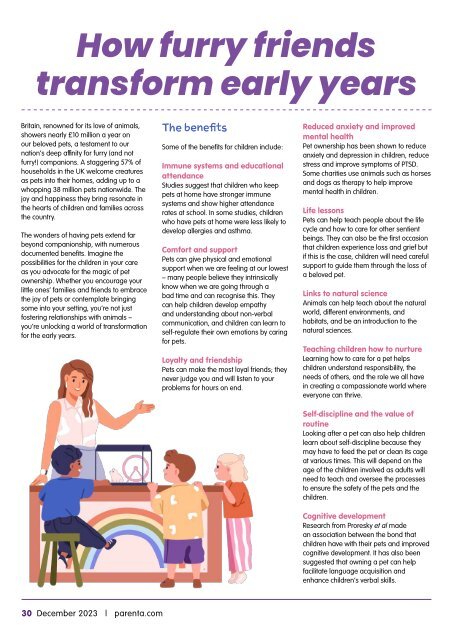Create successful ePaper yourself
Turn your PDF publications into a flip-book with our unique Google optimized e-Paper software.
How furry friends<br />
transform early years<br />
Britain, renowned for its love of animals,<br />
showers nearly £10 million a year on<br />
our beloved pets, a testament to our<br />
nation’s deep affinity for furry (and not<br />
furry!) companions. A staggering 57% of<br />
households in the UK welcome creatures<br />
as pets into their homes, adding up to a<br />
whopping 38 million pets nationwide. The<br />
joy and happiness they bring resonate in<br />
the hearts of children and families across<br />
the country.<br />
The wonders of having pets extend far<br />
beyond companionship, with numerous<br />
documented benefits. Imagine the<br />
possibilities for the children in your care<br />
as you advocate for the magic of pet<br />
ownership. Whether you encourage your<br />
little ones’ families and friends to embrace<br />
the joy of pets or contemplate bringing<br />
some into your setting, you’re not just<br />
fostering relationships with animals –<br />
you’re unlocking a world of transformation<br />
for the early years.<br />
The benefits<br />
Some of the benefits for children include:<br />
Immune systems and educational<br />
attendance<br />
Studies suggest that children who keep<br />
pets at home have stronger immune<br />
systems and show higher attendance<br />
rates at school. In some studies, children<br />
who have pets at home were less likely to<br />
develop allergies and asthma.<br />
Comfort and support<br />
Pets can give physical and emotional<br />
support when we are feeling at our lowest<br />
– many people believe they intrinsically<br />
know when we are going through a<br />
bad time and can recognise this. They<br />
can help children develop empathy<br />
and understanding about non-verbal<br />
communication, and children can learn to<br />
self-regulate their own emotions by caring<br />
for pets.<br />
Loyalty and friendship<br />
Pets can make the most loyal friends; they<br />
never judge you and will listen to your<br />
problems for hours on end.<br />
Reduced anxiety and improved<br />
mental health<br />
Pet ownership has been shown to reduce<br />
anxiety and depression in children, reduce<br />
stress and improve symptoms of PTSD.<br />
Some charities use animals such as horses<br />
and dogs as therapy to help improve<br />
mental health in children.<br />
Life lessons<br />
Pets can help teach people about the life<br />
cycle and how to care for other sentient<br />
beings. They can also be the first occasion<br />
that children experience loss and grief but<br />
if this is the case, children will need careful<br />
support to guide them through the loss of<br />
a beloved pet.<br />
Links to natural science<br />
Animals can help teach about the natural<br />
world, different environments, and<br />
habitats, and be an introduction to the<br />
natural sciences.<br />
Teaching children how to nurture<br />
Learning how to care for a pet helps<br />
children understand responsibility, the<br />
needs of others, and the role we all have<br />
in creating a compassionate world where<br />
everyone can thrive.<br />
Self-discipline and the value of<br />
routine<br />
Looking after a pet can also help children<br />
learn about self-discipline because they<br />
may have to feed the pet or clean its cage<br />
at various times. This will depend on the<br />
age of the children involved as adults will<br />
need to teach and oversee the processes<br />
to ensure the safety of the pets and the<br />
children.<br />
Cognitive development<br />
Research from Proresky et al made<br />
an association between the bond that<br />
children have with their pets and improved<br />
cognitive development. It has also been<br />
suggested that owning a pet can help<br />
facilitate language acquisition and<br />
enhance children’s verbal skills.<br />
How to introduce pets<br />
into your setting<br />
If you want to introduce a pet or pets<br />
into your setting, then it must be done<br />
properly because it is not without risk.<br />
However, with careful planning, governor/<br />
staff and parent buy-in, and robust risk<br />
assessments, the benefits will far outweigh<br />
any potential disadvantages.<br />
Some of the things that you might need to<br />
consider include:
















